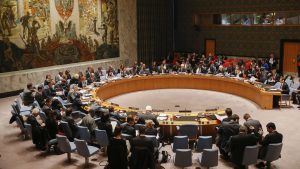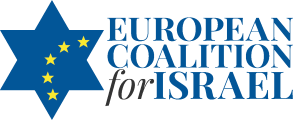 Washington DC, February 10th, 2020 – The European Coalition for Israel has called upon the UN Security Council to give the US peace plan a serious chance to revive peace talks between Israel and the Palestinians. On Tuesday, Palestinian Liberation Organisation (PLO) leader, Mahmoud Abbas, is scheduled to appear before the UN Security Council in New York to make the case for rejecting the US peace plan, even though the plan includes a pledge to improve Palestinian lives by investing a total of 50 billion USD into the Palestinian economy. But his opposition is not shared throughout the Arab region. When the peace plan was presented in the White House on January 28th, representatives from Bahrain, Oman and the United Arab Emirates were in the audience. Abbas did not choose to attend.
Washington DC, February 10th, 2020 – The European Coalition for Israel has called upon the UN Security Council to give the US peace plan a serious chance to revive peace talks between Israel and the Palestinians. On Tuesday, Palestinian Liberation Organisation (PLO) leader, Mahmoud Abbas, is scheduled to appear before the UN Security Council in New York to make the case for rejecting the US peace plan, even though the plan includes a pledge to improve Palestinian lives by investing a total of 50 billion USD into the Palestinian economy. But his opposition is not shared throughout the Arab region. When the peace plan was presented in the White House on January 28th, representatives from Bahrain, Oman and the United Arab Emirates were in the audience. Abbas did not choose to attend.
“The new peace initiative provides a unique opportunity to break the current deadlock in the peace process and restart negotiations for a lasting and comprehensive peace agreement between Israel and the Palestinians”, ECI Founding Director Tomas Sandell said on Monday.
The peace plan has been welcomed by a growing number of Arab states, as well as by key EU-member states despite objections from the new EU High Representative for Foreign Policy, Josep Borrell, who in a private statement could not agree to the creation of a Palestinian state which was not based on the 1949 Armistice Agreement lines. In a comment in Jerusalem on Sunday, US Ambassador to Israel, David Friedman, rejected the option of the 1949 Armistice Agreement lines, also known as the Green lines, as they in no way can be considered to be defensible boundaries for Israel. He pointed out that previous international guarantees to defend Israel’s borders, such as the deployment of UNIFIL troops in Lebanon, have ended in failure. “The only option for Israel is to defend itself, by itself”, he said.
In a letter to the fifteen members of the UN Security Council on Monday, ECI called upon the member states to carefully study the peace plan as a basis for renewed peace talks. On Friday the Tunisian Ambassador to the UN, Moncef Baati, was unexpectedly dismissed from his post after drafting a resolution rejecting the US peace plan, this being a clear indication that the time in which such a plan for peace with Israel can summarily be rejected by the Arab world is over. Tunisia is currently one of the ten non-permanent members of the UN Security Council.
Earlier in the week ECI met with sources close to the White House to learn more about the proposed peace plan. On Wednesday ECI took part in a reception hosted by the Kingdom of Bahrain where a unique declaration of religious freedom was presented. In the declaration the Kingdom of Bahrain refutes any form of hatred in the name of religion, and promotes freedom of choice – which must be seen as an unprecedented move within the Arab world. The dinner was attended by prominent leaders from the Christian and Jewish communities in the US, as well as by key officials from the US administration and from the Kingdom of Bahrain.
This declaration is another significant sign that the realities on the ground are changing rapidly in the Arab world, as a growing number of Sunni Arab states are becoming increasingly concerned about the security threats from the Islamic Republic of Iran and are drawing nearer to the West. As a result of this changing geo-political situation, a number of the Gulf states are embarking on a substantial reform process.
“This reform process, combined with the recent rapprochement between moderate Arab Gulf states and Israel, provide yet another unique opportunity to revive the Middle East peace process. Any peace plan can only be sustained by the active support of Israel’s Arab neighbours”, Sandell concluded.
